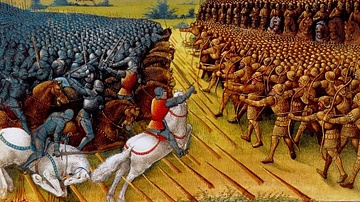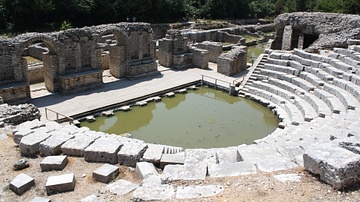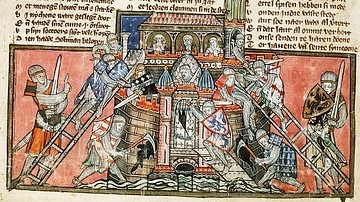Search
Did you mean: Galatia?
Search Results

Definition
Empire of Nicaea
The Empire of Nicaea was a successor state to the Byzantine Empire, or rather a Byzantine Empire in exile lasting from 1204 to 1261 CE. The Empire of Nicaea was founded in the aftermath of the sacking of Constantinople during the Fourth Crusade...

Definition
Battle of Nicopolis
The Battle of Nicopolis in September 1396 CE, also known as the Nicopolis Crusade, was an attempt by French, Hungarian, and other European allies to curb the threat of the Ottoman Turks as they pressed ever westwards into Europe. Nicopolis...

Definition
Butrint
Butrint (ancient name Buthrotum) is located on the fertile coast of Epirus in present-day Albania and was an important settlement in Hellenistic and Roman times due to its position on the route from Italy to mainland Greece down the Ionian...

Article
The Causes of WWII
The origins of the Second World War (1939-45) may be traced back to the harsh peace settlement of the First World War (1914-18) and the economic crisis of the 1930s, while more immediate causes were the aggressive invasions of their neighbours...

Article
The Causes of WWI
The origins of the First World War (1914-18) are many and varied, with some even dating back several decades, but a political assassination in the Balkans in the summer of 1914 was the spark that blew up Europe's political powder keg, that...

Article
The Invasion of Poland in 1939
The leader of Nazi Germany Adolf Hitler (1889-1945) ordered the invasion of Poland on 1 September 1939. Hitler's refusal to withdraw brought a declaration of war from Britain and France on 3 September, and so began the Second World War (1939-45...

Article
The Mongol Invasion of Europe
The Mongol invasions of Russia and Eastern Europe occurred first with a brief sortie in 1223 CE and then again in a much larger campaign between 1237 CE and 1242 CE. The Mongols, seemingly coming from nowhere and quickly gaining a reputation...

Article
Hitler's Occupation of Czechoslovakia
Throughout 1938, Adolf Hitler (1889-1945), the leader of Nazi Germany, threatened to occupy the Sudetenland region of Czechoslovakia. The excuse presented was that Sudeten Germans were being repressed but Hitler was intent on creating a 'Greater...

Article
Seven Notorious Women Pirates
In this article, we look at the lives and deeds of seven notorious women pirates. There is Teuta, the Balkan enemy of ancient Rome; Alwilda, the Scandinavian princess who chose a life of crime on the High Seas; Maria Lindsey, who terrorized...

Article
The Siege of Antioch, 1097-98 CE
The siege of Antioch in 1097-1098 CE occurred during the First Crusade (1095-1102 CE) when the western Crusader knights were on their way to retake Jerusalem. The great metropolis of Antioch in northern Syria was heavily fortified, and it...